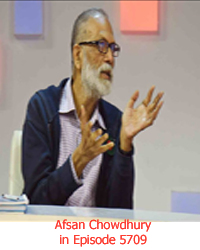Afsan Chowdhury

| Researcher, Columnist |
| Journalist, Media Professional, Researcher, Social Activist, Author, Blogger and much more |
Full Name: Afsan Chowdhury
Affiliation: BRAC University
Current Position: Professor
Date of Birth: February 16, 1952
Place of Birth: Bangladesh
Home District: Dhaka
Nationality: Bangladeshi
Profile:
Afsan Chowdhury(born 16 February 1952) is a Bangladeshi Liberation War Researcher, Journalist, Media Professional, Social Activist, Author, Blogger and much more.He is the Director of Advocacy and Human Rights at BRAC, the world's largest NGO and a faculty of BRAC University. Before joining Brac in 2003, he has worked in print, radio and television media for over two decades. He has served in editor's position for a number of news papers and has been a Founder Promoter of UNB - the National News Agency. He has also been a Contributing Producer for a number of BBC World Service series and is the author of four novels.
Chowdhury has an MA in History from Dhaka University. He has spent years working in the fields of media advocacy, health rights, communication and social mobilization, AIDS management, gender and protection, child rights, and disaster management. Mr. Chowdhury worked for UNICEF as a media and communications expert, later becoming a freelance consultant and activist in 1994. He is the author of numerous project reports and position papers, and has worked extensively with a host of international NGOs and the Government of Bangladesh. He was nominated Ashoka Fellow for Life on Sex Education in 1998. Mr. Chowdhury was also Regional Director for South Asia of the Panos Institute.
Chowdhury has had a parallel career in development work and the media. He has been active in multi-disciplinary research, media relations, journalism, and program development for two decades, and is one of the editors of an authoritative work on Bangladesh's War of Independence. He held a high position in UNICEF, but left to become a freelancer and social activist. He was also the BBC's correspondent in Bangladesh but left to concentrate on development-related work. These two resignations are indicative of his personality. Both were extremely prestigious jobs, but he gave them up to pursue social activism. In 1994, he established, HASAB, a funding nonprofit for organizations working in the area of HIV, STDs, and AIDS.
Chowdhury has had remarkable success in designing communications materials that appeal to both the youth and elders alike. In 1995 he developed a fifteen-part sex education series for the BBC entitled "Sexwise," which aired in 1995-96. The first broadcasting of such a program in Asia, the series reached ten million listeners and became the most successful radio series in Bangladesh. The companion book to the series completely sold out of stores. His reputation as a media professional and development worker is firmly established. Chowdhury says that he cherishes freedom most and that is why he has dropped out of the conventional career tracks to do work that he finds directly relevant to his and other people's lives.Afsan Chowdhury is the Director of Advocacy and Human Rights at BRAC, the world's largest NGO. His responsibilities include policy direction and implementation of the information and communication activities of BRAC. He has supervised community based communication activities, which together form the largest communication initiative in Bangladesh.As Regional Director for South Asia Panos Institute based in Kathmandu. 2000-2001, he supervised Panos activities in five south Asian countries including the Panos India office, and he was responsible for the preparation of all donor proposals, reports and media publications.
Chowdhury was on the staff of UNICEF 1986-1994 with responsibility for programme communication and information activities. He supervised numerous communication related studies and research which fed into national programmes. They include reports on Public Service Broadcasting (1988) and the dissemination of messages on health issues through broadcast media (1989). His study on factors Relating to AIDS/ STD in Bangladesh (1993) was the first review on the topic and formed the basis for subsequent programmes.As a member of the UNICEF Regional (ROSA) office core team on development of media advocacy and health rights, he contributed to policy documents on AIDS and the Media in India and Nepal. He has carried out many assignments on key developmental, media and management issues for international organizations including UNDP and OXFAM -UK, and for independent policy institutes and ngos in Bangladesh. He has participated in policy advisory groups for UNICEF and WHO. In 1998 he was nominated Ashoka Fellow for Life on Sex Education.
Chowdhury has written or co-written books on health and environmental issues, refugees and issues of Human Rights and Identity for minorities. His books include 'Media in Times of Crisis' (Srabon Publishers. 2003). His report 'Radda Barnen: Non-Commercial sexual abuse of children' prepared for Breaking the Silence Group in 1997, is due for publication as a book in 2004.
Chowdhury’s media-related Studies include a Country Report on Bangladesh for the UNDP- supported Paragon Project (2001 -2003) ; and for the Nordic Consulting Group, a Media study on CBM in South Asia relating to cross border conflicts.Afsan Chowdhury has extensive experience in the print and broadcast media, both radio and television. He has been on the editorial staff or contributor to leading newspapers and journals in Bangladesh over a period of more than 20 years, a frequent contributor to the BBC World Service, and stringer in Dhaka for the BBC South Asian Service (1993-95). He has produced video documentaries on social political and developmental issues in Bangladesh.
For the Media South Asia Project, Afsan Chowdhury wrote a Country Profile and report on the media in Bangladesh; set up and conducted Focus Group Discussions and conducted interviews with leading media practitioners and observers. He spoke at or chaired discussions on broadcasting policy issues at Media South Asia project conferences in Delhi, Kathmandu, Dhaka and in Manikganj.
PUBLICATIONS
- Media in Times of Crisis
- Biswasghatokgon (The Betrayers)
- Benchey Thakar Shobdo (Sounds of Staying Alive)
Awards
Bangla Academy Literary Award (2018)
Register for comment









